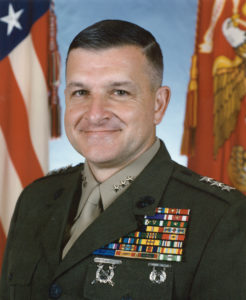More on U.S. attack on Syria violating the U.S. Constitution & International law
https://consortiumnews.com/2018/04/14/attacking-syria-thumbing-noses-at-constitution-and-law/
Attacking Syria: Thumbing Noses at Constitution and Law
By Ray McGovern Special to Consortium News
 The U.S. Constitution and international law suffered a stinging blow last night at the hands of an odd coalition that might be called Goldilocks and two moral dwarfs posing as Marine generals, together with a “Right Dishonorable” harridan and a young French poodle.
The U.S. Constitution and international law suffered a stinging blow last night at the hands of an odd coalition that might be called Goldilocks and two moral dwarfs posing as Marine generals, together with a “Right Dishonorable” harridan and a young French poodle.
As was the case 15 years ago when the U.S. and UK launched a war of aggression against Iraq, the pretext was so-called “weapons of mass destruction” (WMD) — this time the claimed use on April 7 of chlorine (and maybe the nerve agent sarin — who knows?) in Duma a suburb of Damascus. And this time French President Emmanuel Macron was allowed to join, as junior partner, the gang that can’t lie straight.
The attacks by the Gang of Three came hours before specialists from the UN Organization for the Prohibition of Chemical Weapons were to arrive in Syria to study soil and other samples in Duma. The question leaps out: Why could the Gang not wait until the OPCW had a chance to find out whether there was such an attack and, if so, what chemical(s) were used?
U.S. Defense Secretary James Mattis could only say that he believes there was a chemical attack and that perhaps sarin, in addition to chlorine, was involved. Serving until now as the only available “evidence” are highly dubious reports from agenda-laden “social media.” What is clear is that the U.S./UK/French Gang wanted to strike before the OPCW investigators had a chance to ascertain what happened. Hmm. All the earmarks of “Sentence first; verdict afterwards.”
Former Secretary of State John Kerry made a habit of advertising how “extraordinarily useful” social media can be. He got that right. Of the main alleged “chemical attacks” by Syria — on August 21, 2013; April 4,2017; and April 7, 2018 — the primary, if not exclusive — source of information was the “extraordinarily useful,” but notoriously unreliable, “social media.”
Marine Martinets
Briefing the media last night, after Goldilocks had set the stage announcing “retaliation” for the (unproven) use of chemicals by the Syrian government, were two four-star Marine generals, one of them (Mattis) retired, who seem to have mistakenly thought that the Marine motto had been changed to “Semper Lie.” It was a very sad spectacle.
In 1961, when I was commissioned a 2nd Lieutenant in the U.S. Army, I took a solemn oath to support and defend the Constitution of the United States against all enemies foreign and domestic. Also drummed into the heads of us newly minted officers was the obligation to tell the truth — always.
I had assumed — apparently naively — that Marines took the same oath and obligation. The attack on Iraq 15 years ago destroyed that assumption. I will cite just two examples that scandalized me.
Hear No Evil, Speak No Truth, Get Rich Quick
Marine Gen. Zinni was receiving an award at the Veterans for Foreign War convention on August 26, 2002, and decided to play Brer’ Rabbit as he listened to the main speaker, Vice President Dick Cheney, set the meretricious terms of reference for war with Iraq.
Zinni had been commander of CENTCOM and had retired two years before, but his continued role as fully cleared consultant had enabled him to stay up to date on key intelligence findings for Iraq. Zinni later said he was shocked to hear Cheney’s depiction of intelligence (Iraq has WMD and is amassing them to use against us) that did not square with what he knew the accurate intelligence to be. “There was no solid proof that Saddam had WMD. … I heard a case being made to go to war,” Zinni told Meet the Press three and a half years later. (Emphasis mine.)
Earlier, Zinni enjoyed a reputation as a relatively straight shooter with a good bit of courage. And so, the question lingers: why did he not go public when he first heard Cheney’s lie? THAT might have stopped the war. What seems operative here, I fear, is an all-too-familiar conundrum at senior levels where people have been conditioned not to rock the boat, not to risk their standing within the Washington Establishment or their prospects for lucrative spots on the corporate boards of arms manufacturers.
Semper Fraud
Without the full cooperation of former Marine, Senator Pat Roberts (R, Kansas), who was Chairman of the Senate Intelligence Committee before, during, and after the attack on Iraq, Bush and Cheney would have had far more difficulty perpetrating that crime. Because of Roberts’s participation in what easily qualifies as a criminal conspiracy, Bush and Cheney were able to run amok — until, finally, the Senate changed hands in 2006.
On June 5, 2008 Roberts’s successor, Sen. Jay Rockefeller announced the completion of a five-year Senate Intelligence Committee investigation — a study that had been continually sidetracked by Roberts. Rockefeller introduced the study’s bipartisan findings with these words: “In making the case for war, the Administration repeatedly presented intelligence as fact when in reality it was unsubstantiated, contradicted, or even non-existent.”
Fellow Marine and UN weapons inspector Scott Ritter found Roberts’s behavior shameful. Ritter was unable to resist writing: “Semper Fraud, Senator Roberts.”
Against that background, it was particularly painful last evening to watch two Marine four-star generals peddling at the Pentagon a bogus casus belli for another unprovoked armed attack — this time on Syria.
Media people favored with a Pentagon pass were too timid to ask pointed questions about the evidence that Syrian President Bashar al-Assad, for some strange reason known only to him, picked a time of near victory to “use chemical weapons against his own people” on April 7. No one asked why the rush to judgment; why the gang of three (the U.S., its aging British cousin, and its young French poodle) could not have waited just a day or two for UN inspectors to arrive and discover whether the so-called “chemical attack” amounted to a true casus belli, or a casus belly-laugh.
Defense Secretary James Mattis and Joint Chiefs of Staff Chairman Joseph Dunford remind me of the generals of the Third Reich in “just following orders,” lying through their teeth about the pretext for attacking Poland — er, I mean Syria — as though the solemn oath they took was to the Fuehrer — er, I mean President — not the Constitution. It seemed, at first, that President George W. Bush’s dictum still reigned at the Pentagon; i. e., “The Constitution is just a goddamned piece of paper.” But President Donald Trump and Secretary Mattis did not go as far as Bush. No doubt under White House orders, Mattis dutifully recited the key tenet of constitutional scholar Dick Cheney’s dubious “unitary executive” theory; that is, that the President is somehow not bound by Article I (Section 8) of the Constitution. That Article I section may have been in mothballs since the attack on Pearl Harbor, but remains a very important part of the Constitution. And the U.S. has gotten into a peck of trouble by those —administrations and members of congress, alike — who have chosen to circumvent this key provision, which reserves to Congress the power to declare war. Our Founders wanted this to apply, if a King — er, I mean President — got it into his head to attack another country. Syria, for example.
At the beginning of his speech, Mattis employed this dubious variant, without the slightest demurral from those wishing to retain their Pentagon passes: “As our commander in chief, our President has the authority under Article II of the Constitution to use military force overseas to defend important U.S. national interests.”
Those interested should re-read Article II. They will look in vain for anything like the Cheney/Mattis variant. All that part of Article II says is: “The President shall be Commander in Chief of the Army and Navy of the United States.”
A Common Error With Budding Officers Too
An experience I had teaching a class at the Naval Academy in Annapolis 12 years ago suggests that students at U.S. military academies are led to think that Article II supersedes Article I. Lecturing to a third-year class of about 50 students about political/military events, I referred innocently to the solemn oath required of military personnel and asked what that oath was all about. “Well, it is an oath to the President, of course,” said the first student who threw up his hand, with several others nodding assent. I said that was quite wrong. And it turned out to be like pulling teeth to find one student who knew that the oath was to defend the Constitution.
Last evening I found myself wondering what Attorney General Jeff Sessions thought of Mattis’s messing with Article I, Section 8. For, not too long ago, there was one shining moment when Sen. Jeff Sessions did his best to challenge then-Defense Secretary Leon Panetta, who pretended to be unfamiliar with the bedrock fact that the Constitution reserved to Congress the right to declare war.
Libya: Precedent for Syria
At a hearing of the Senate Armed Services Committee on March 7, 2012, then-Sen. Jeff Sessions, R-Alabama, pursued this key issue with Panetta. Chafing ex post facto at the unauthorized nature of the war in Libya, Sessions asked repeatedly what “legal basis” would the Obama administration rely on to do in Syria what it did in Libya.
Watching that part of the testimony, it seemed to me that Sessions, a conservative Southern lawyer, was not at all faking when he pronounced himself “almost breathless,” as Panetta stonewalled time after time. Panetta made it explicitly clear that the administration does not believe it needs to seek congressional approval for wars like Libya. At times he seemed to be quoting verses from the Book of Cheney.
Sessions: “I am really baffled … The only legal authority that’s required to deploy the U.S. military [in combat] is the Congress and the President and the law and the Constitution.”
Panetta: “Let me just for the record be clear again, Senator, so there is no misunderstanding. When it comes to national defense, the President has the authority under the Constitution to act to defend this country, and we will, Sir.”
If you readers care about the Constitution and the rule of law, I strongly recommend that you view the entire 7-minute video clip.
Constitutionally, the craven Congress is a huge part of the problem. Only a few members of the House and Senate seem to care very much when presidents act like kings and send off troops drawn largely by a poverty draft to wars not authorized (or simply rubber-stamped) by Congress.
A Chill on the First Amendment
Secretary Mattis devoted his last minute last evening to a careful reading of the following warning:
“Based on recent experience, we fully expect a significant disinformation campaign over the coming days by those who have aligned themselves with the Assad regime. And, in an effort to maintain transparency and accuracy, my assistant for public affairs, Ms. Dana White, and Lt. Gen. McKenzie, Director General of the Joint Staff here in Washington, will provide a brief of known details tomorrow morning — we are anticipating at about 9:00 in this same location.”A warning not so sotto voce: Criticize the craven behavior of Mattis, Dunford, or the Gang of Three, and you will be “aligning” yourself “with the Assad regime.”





